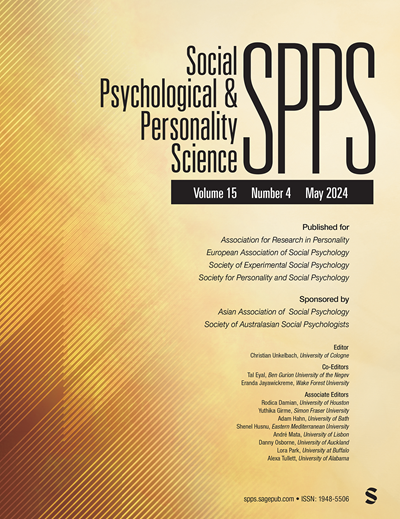Do Female and Male Role Models Who Embody STEM Stereotypes Hinder Women’s Anticipated Success in STEM?
IF 3.3
2区 心理学
Q1 PSYCHOLOGY, SOCIAL
引用次数: 402
Abstract
Women who have not yet entered science, technology, engineering, and mathematics (STEM) fields underestimate how well they will perform in those fields (e.g., Correll, 2001; Meece, Parsons, Kaczala, & Goff, 1982). It is commonly assumed that female role models improve women’s beliefs that they can be successful in STEM. The current work tests this assumption. Two experiments varied role model gender and whether role models embody computer science stereotypes. Role model gender had no effect on success beliefs. However, women who interacted with nonstereotypical role models believed they would be more successful in computer science than those who interacted with stereotypical role models. Differences in women’s success beliefs were mediated by their perceived dissimilarity from stereotypical role models. When attempting to convey to women that they can be successful in STEM fields, role model gender may be less important than the extent to which role models embody current STEM stereotypes.体现STEM刻板印象的男女榜样是否阻碍了女性在STEM领域的预期成功?
尚未进入科学、技术、工程和数学(STEM)领域的女性低估了她们在这些领域的表现(例如,Correll, 2001;Meece, Parsons, Kaczala, & Goff, 1982)。人们普遍认为,女性榜样可以增强女性在STEM领域取得成功的信念。目前的工作验证了这一假设。两个实验改变了角色模范的性别,以及角色模范是否体现了计算机科学的刻板印象。榜样性别对成功信念没有影响。然而,与非刻板印象的榜样互动的女性认为,她们在计算机科学方面比那些与刻板印象的榜样互动的女性更成功。女性成功信念的差异是由她们与刻板印象中的角色模型的感知差异所介导的。当试图向女性传达她们可以在STEM领域取得成功时,榜样性别可能不如榜样体现当前STEM刻板印象的程度重要。
本文章由计算机程序翻译,如有差异,请以英文原文为准。
求助全文
约1分钟内获得全文
求助全文
来源期刊

Social Psychological and Personality Science
PSYCHOLOGY, SOCIAL-
CiteScore
12.50
自引率
1.80%
发文量
77
期刊介绍:
Social Psychological and Personality Science (SPPS) is a distinctive journal in the fields of social and personality psychology that focuses on publishing brief empirical study reports, typically limited to 5000 words. The journal's mission is to disseminate research that significantly contributes to the advancement of social psychological and personality science. It welcomes submissions that introduce new theories, present empirical data, propose innovative methods, or offer a combination of these elements. SPPS also places a high value on replication studies, giving them serious consideration regardless of whether they confirm or challenge the original findings, with a particular emphasis on replications of studies initially published in SPPS. The journal is committed to a rapid review and publication process, ensuring that research can swiftly enter the scientific discourse and become an integral part of ongoing academic conversations.
 求助内容:
求助内容: 应助结果提醒方式:
应助结果提醒方式:


